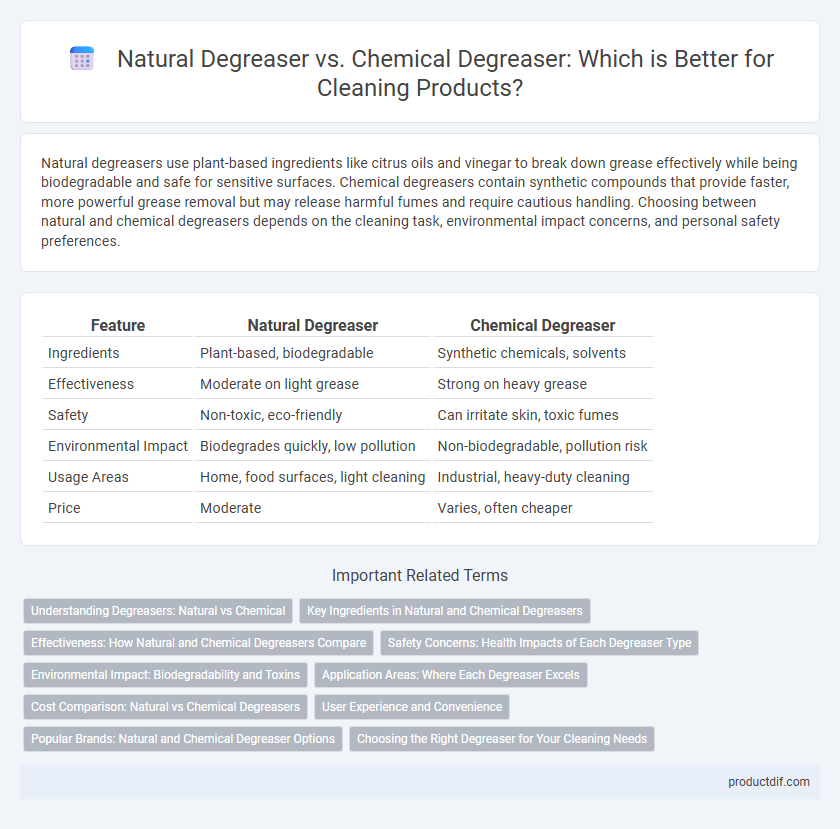Natural degreasers use plant-based ingredients like citrus oils and vinegar to break down grease effectively while being biodegradable and safe for sensitive surfaces. Chemical degreasers contain synthetic compounds that provide faster, more powerful grease removal but may release harmful fumes and require cautious handling. Choosing between natural and chemical degreasers depends on the cleaning task, environmental impact concerns, and personal safety preferences.
Table of Comparison
| Feature | Natural Degreaser | Chemical Degreaser |
|---|---|---|
| Ingredients | Plant-based, biodegradable | Synthetic chemicals, solvents |
| Effectiveness | Moderate on light grease | Strong on heavy grease |
| Safety | Non-toxic, eco-friendly | Can irritate skin, toxic fumes |
| Environmental Impact | Biodegrades quickly, low pollution | Non-biodegradable, pollution risk |
| Usage Areas | Home, food surfaces, light cleaning | Industrial, heavy-duty cleaning |
| Price | Moderate | Varies, often cheaper |
Understanding Degreasers: Natural vs Chemical
Natural degreasers rely on plant-based enzymes and essential oils to break down grease effectively while being eco-friendly and non-toxic, making them safe for household use and sensitive surfaces. Chemical degreasers typically contain synthetic solvents and surfactants that offer rapid and powerful grease removal but may pose health risks and environmental concerns due to their corrosive and non-biodegradable nature. Understanding the composition and impact of these degreasers enables informed choices that balance cleaning efficiency with health and sustainability considerations.
Key Ingredients in Natural and Chemical Degreasers
Natural degreasers typically contain key ingredients such as citrus extracts, vinegar, baking soda, and plant-based enzymes, which break down grease using biodegradable compounds. Chemical degreasers rely on synthetic ingredients like solvents, alkalis, and surfactants, including sodium hydroxide and petroleum-based compounds, for stronger grease removal. The choice of key ingredients impacts environmental safety, biodegradability, and effectiveness against stubborn grease stains.
Effectiveness: How Natural and Chemical Degreasers Compare
Natural degreasers, derived from plant-based oils and enzymes, effectively break down mild to moderate grease with minimal environmental impact and safe indoor use. Chemical degreasers, containing solvents like glycol ethers and caustic agents, offer rapid and powerful grease removal, especially in heavy-duty industrial settings. While chemical degreasers provide superior strength for tough grime, natural degreasers excel in safety and biodegradability, making each suited for different cleaning needs.
Safety Concerns: Health Impacts of Each Degreaser Type
Natural degreasers typically contain plant-based ingredients that reduce exposure to harmful chemicals, minimizing respiratory irritation and skin allergies during use. Chemical degreasers often include volatile organic compounds (VOCs) and solvents linked to health risks such as headaches, dizziness, and long-term organ damage with prolonged exposure. Choosing natural degreasers enhances indoor air quality and reduces toxic residue, promoting safer household and industrial cleaning environments.
Environmental Impact: Biodegradability and Toxins
Natural degreasers typically offer superior environmental benefits due to their high biodegradability and absence of toxic chemicals, reducing harm to aquatic ecosystems and soil health. Chemical degreasers often contain synthetic solvents and surfactants that persist in the environment, contributing to pollution and bioaccumulation of hazardous toxins. Choosing biodegradable natural formulations supports sustainable waste management and lowers ecological risks associated with cleaning processes.
Application Areas: Where Each Degreaser Excels
Natural degreasers excel in kitchen environments, food processing plants, and organic farming operations due to their biodegradable nature and safety around food surfaces. Chemical degreasers are more effective in industrial settings such as automotive workshops, heavy machinery maintenance, and manufacturing plants where strong solvents are needed to break down tough grease and oil deposits. Choosing the appropriate degreaser depends on the specific application area, balancing environmental impact with cleaning power requirements.
Cost Comparison: Natural vs Chemical Degreasers
Natural degreasers often cost more upfront due to plant-based ingredients and eco-friendly formulations but can reduce long-term expenses by minimizing health risks and environmental damage. Chemical degreasers are typically cheaper initially, providing rapid and powerful grease removal but may incur higher costs over time from potential harm to surfaces, user safety, and disposal fees. Evaluating total cost of ownership reveals natural degreasers support sustainability goals while chemical alternatives prioritize immediate budget constraints.
User Experience and Convenience
Natural degreasers offer a user-friendly experience with fewer harsh odors and less skin irritation, enhancing safety during household cleaning tasks. Chemical degreasers provide fast-acting, powerful grease removal, making them highly convenient for stubborn or heavy-duty cleaning needs. Users seeking an eco-friendly, gentle option often prefer natural formulas, while those prioritizing strong, immediate results typically favor chemical-based degreasers.
Popular Brands: Natural and Chemical Degreaser Options
Popular natural degreaser brands like Simple Green and Method emphasize plant-based ingredients for effective, eco-friendly cleaning. Chemical degreaser options such as Krud Kutter and Zep rely on strong solvents to tackle heavy grease and industrial grime. Consumers prioritize natural degreasers for safety and sustainability, while chemical variants are preferred for intense cleaning power in commercial settings.
Choosing the Right Degreaser for Your Cleaning Needs
Natural degreasers, derived from plant-based ingredients such as citrus oils and vinegar, offer an eco-friendly and non-toxic solution ideal for light to moderate grease removal on kitchen surfaces and delicate materials. Chemical degreasers, composed of synthetic solvents and surfactants, provide powerful grease-cutting abilities suitable for heavy-duty industrial cleaning and stubborn oil buildup. Selecting the right degreaser depends on the surface type, intensity of grease, and environmental considerations, ensuring effective cleaning without damaging surfaces or compromising safety.
Natural degreaser vs Chemical degreaser Infographic

 productdif.com
productdif.com